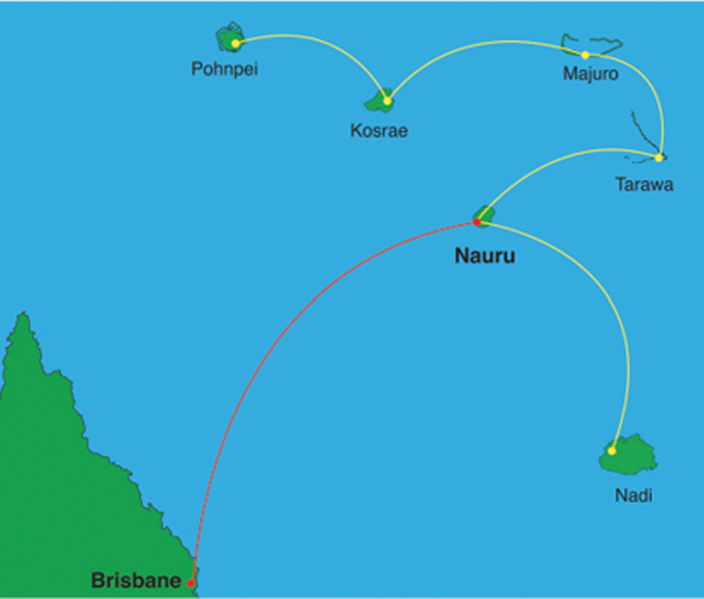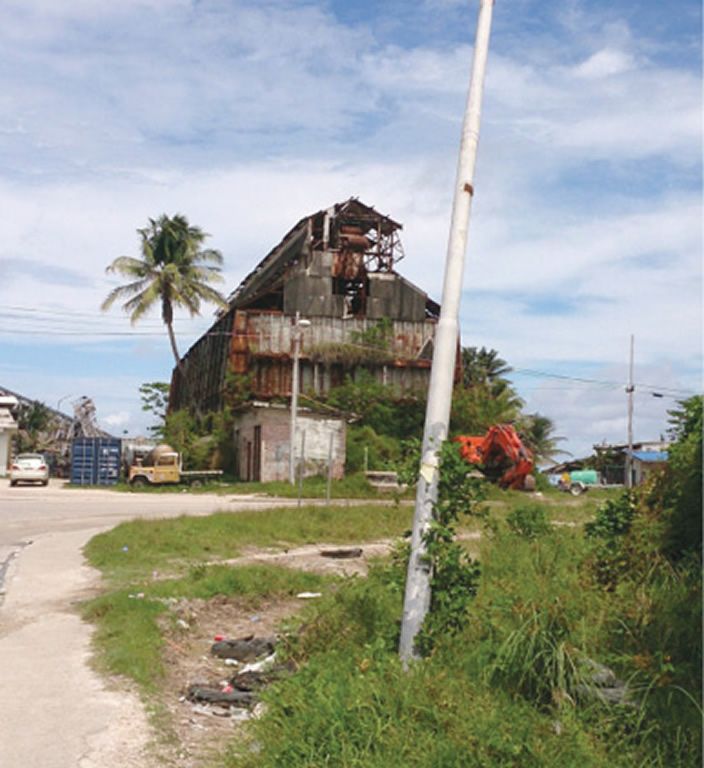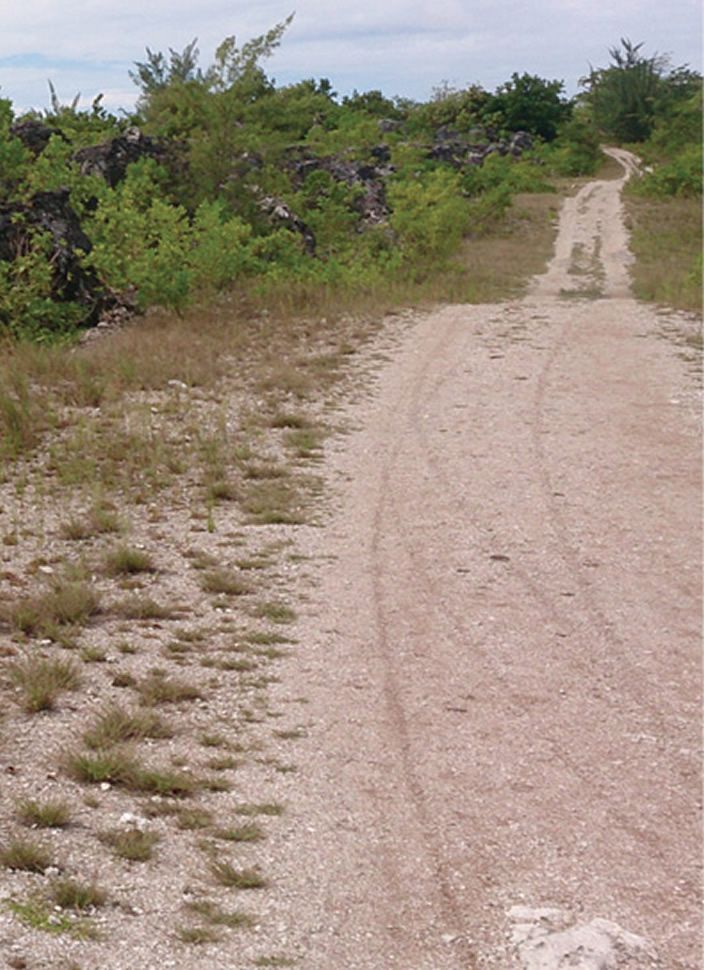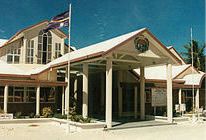Last August, I read a story in The Saturday Paper ‘Nauru rapes - there is a war on women’. I knew life was hard on Nauru but I had no idea women – particularly unaccompanied young women – were being humiliated, sexually harassed and raped. Terrifyingly, the women are now stuck on this tiny island – it’s about the size of Melbourne airport – where they live cheek by jowl with the rapists for the rest of their lives.
Teaching on Nauru: The untold story


Refugee housing near the sea
Within days some of us had formed a group called Australian Women in Support of Women on Nauru. It was comprised of myself, Professor Carmen Lawrence, Professor Wendy Bacon, Claire O’Connor, Pamela Curr and Luisa Low.
Our objective is to bear witness to the suffering of women on Nauru. We were able to crowd source $20,000 within 24 hours to send both Professor Lawrence and Professor Bacon to Nauru on a fact finding mission. In response, the Nauru government – or what’s left of it – announced all foreign journalists were banned from Nauru.

Sunset on misery
With access totally denied – no media, civil society or any NGOs left on the island, we decided to spend three months researching and documenting the violence against women on Nauru and all the associated issues. That timeline has now grown to six months as more information comes to light.
We have been inundated with stories from those who have worked there as teachers and other service providers. They have told us their stories knowing the Border Force Act 2015 means they risk two years jail in doing so.
The date of the report launch is yet to be finalised – given the ongoing revelations about Nauru – but we expect it be done in early June and the launch will be national and international.

Suffer the little children
When the Gillard Labor Government reopened the Nauru detention centres – there are three centres – in 2012, Father Carty, Coordinator of Marist Asylum Seekers and Refugee Services warned:
“The government may think it is solving a problem by putting asylum seekers out of sight on a remote island, but it is also creating a multitude of other human related issues as well as breaking United Nations Conventions on Refugees and the Rights of the Child.”
Four years later, those who have been on Nauru teaching have no doubt the Rights of the Child have been trampled on this far flung island.
As the President of the Human Rights Commission Gillian Triggs said, “The medical and other data in the Report provide credible and objective evidence that mandatory, prolonged, often isolated and indefinite detention, has a significantly damaging effect on children.”
The Report of the Commission’s Inquiry into the impact of immigration detention on children, The Forgotten Children, makes that case in disturbing detail.
But what is the experience on the ground for the Australian teachers who go to Nauru full of optimism and hope that they can make a bad situation a little better?
It is worth remembering that Nauru is now a shell of an island. It has had the top six metres of soil removed by phosphate mining, leaving the sharp ‘pinnacles’ of coral beds as bare bones covering the island. The mining also released toxic minerals like cadmium that swirl across the landscape contaminating water supplies and any food grown. The temperature goes from 25 to 40 degrees with intense humidity and sometimes torrential rain. Finally, with next to no garbage collection, the pinnacles are being filled in with refuse and rubbish. Water is flown in, as are all food supplies. It is a tough, torn island to live on.

Phosphate processing plant
Statements from teachers who spent time there last year
“It is such a hard work place. There are not enough basic teaching resources. The one faulty photocopier is shared by about 20 people, the audio CD system is poor quality, there is all the unlocking and locking up of chairs and tables after class so that they aren’t removed by the men – who probably don’t have anything else to sit on apart from their beds. The noise of the fans, the sound system coming through from the gym, the garbage trucks rolling past the tents, the CB radios of the security guards, the comings and goings of students is endlessly distracting.”
From another teacher
“A family with two young children was ‘medevac’d’ off Nauru as the mum had cancer. I taught one of them. Before she left the little girl presented as a very vague and challenged student. She struggled academically and emotionally. She was unable to interact with her peers in age appropriate manner. It was my belief that she was on the autism spectrum and had very special needs. But after her return to Nauru after five months in Australia attending an Australian school the young girl was unrecognisable as a student and child. She was academically years above the peers that once ran rings around her and emotionally she could hold adult conversations with intelligent and sociable context.”

Lonely road through the pinnacles
And then there are the bad days.
“It feels like everything falls apart – the long hard hours, the oppressive heat and faulty connections. I try to remember that I’m doing okay in this very foreign situation. I need to feel good about what I’ve done so far with the students and their needs. I have engaged them and really enjoyed their application and their responsiveness. The hardest class is my daily visit to the family camp RPC3 – the classes are too big, with up to 60 people. My voice gets hoarse, trying to rise above the whirring fans, the chatter of people, just two rows of desks in the very wide room, which is just half a tent. It is exhausting.”
The Moss Review, the Senate Select Committee into Conditions and treatment of asylum seekers and refugees at the regional processing centres in Nauru and PNG and the Australian Human Rights Commission, The Forgotten Children have all documented the trauma indefinite detention inflicts on children, the suicidal behavior, the self harm, bed wetting, sexualised behaviour and of course the despair.
However there has been no research into the impact teaching in these places of such trauma and despair has had on the teachers themselves. While no one is suggesting the impact would be as acute as it is on those being detained, from our conversations with teachers it is clear the teachers feel a huge amount of conflict, guilt and sorrow.
Evan Davis was contracted to teach the children of asylum seekers at an Australian funded school on the island from 2014 until the school was closed in the middle of last year.
Davis told the ABC recently: “I remember when it was announced that the school was closing, the parents were in absolute tears because … they said in their own words, ‘this is the last good thing that we have on this island’.

By contrast - Nauru parliamentary building
Hard to live with
“Ever since I came back, and I’ve been back in Australia since July, I don’t think a day goes past where I don’t think about these students,” Davis told PM. “But I also just constantly think about the damage that we’re doing to them by detaining them on the island, and also the damage that we’ll be doing to these people if we return them. So I just can’t live with myself with the thought that I’ve witnessed this.”
After Save The Children left Nauru late last year children were forced to go to the local Nauru schools. One teacher has told Fairfax Media that since the change, bullying by students and teachers had become rife, teacher training was poor and the special education needs of asylum seeker and refugee children were not being met.
There are 1200 asylum seekers and refugees on Nauru today. Just under 500 in the detention centres and approximately 700 living outside the centres.
For further information, engagement and volunteering check:
ChilOut – Children out of Immigration DetentionAsylum Seeker Resource Centre www.chilout.org
https://www.facebook.com/AWSWN/?fref=ts
http://www.aph.gov.au/Parliamentary_Business/Bills_Legislation/Bills_Search_Results/Result?bId=r5408







































































































































